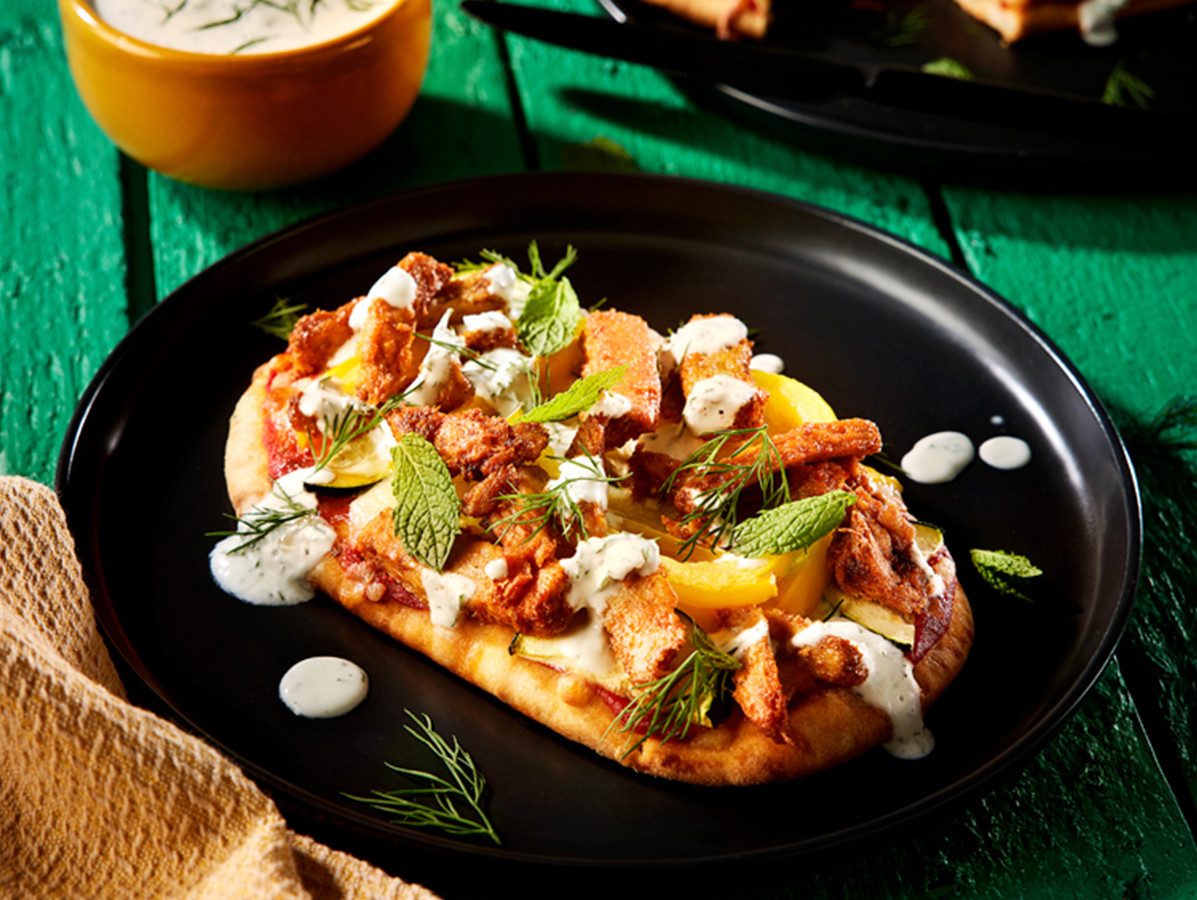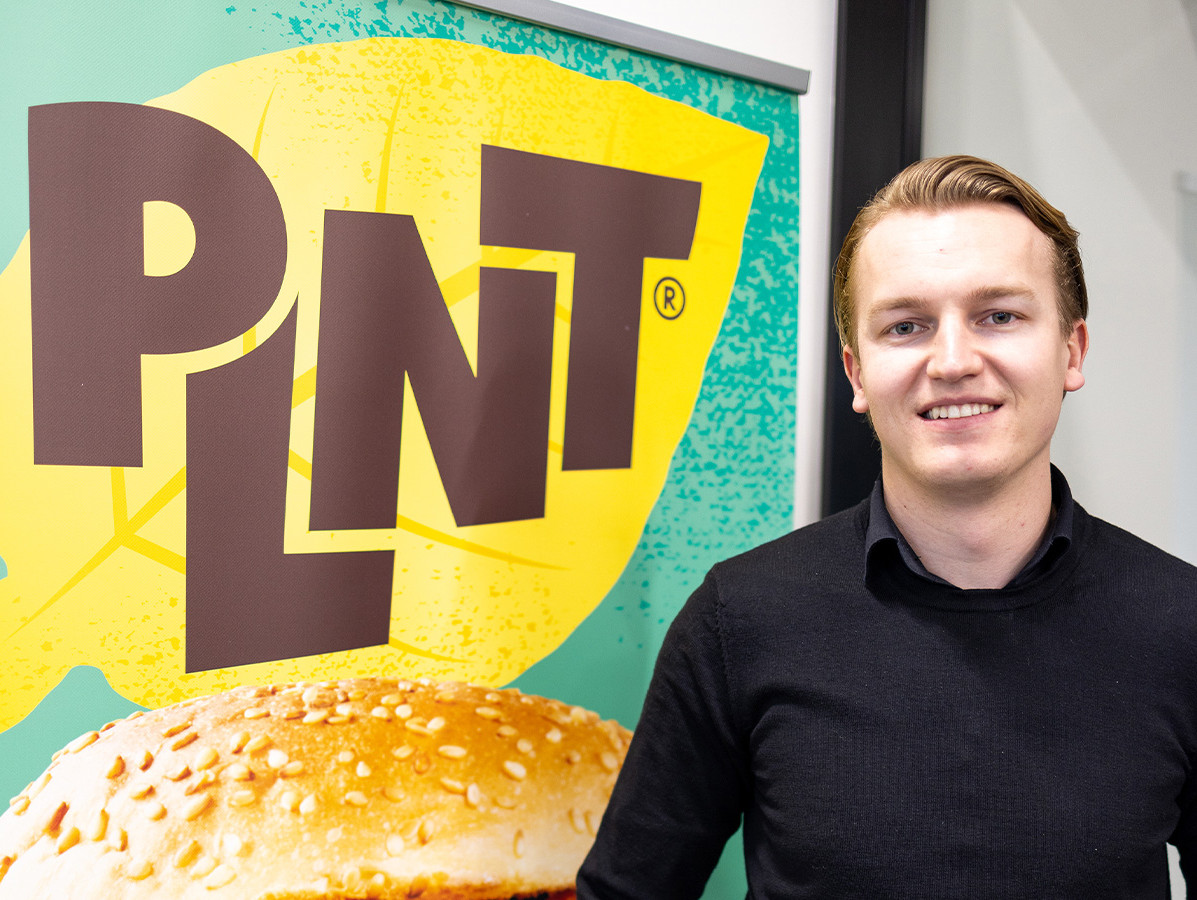
Sales figures seem to be stagnating and the debate about low nutritional values is boiling over. Nevertheless, the Jan Zandbergen Group, one of the largest meat suppliers in Europe, is fully committed to meat substitutes. Laurens Zandbergen, grandson of the founder and marketing manager of the company, explains their approach.
Ask Laurens Zandbergen which of the company's own meat substitutes he likes best, and he chooses the plant-based beef stroganoff strips. "Those taste really great. The strips absorb the sauce and spices and have a really good juice release, a term we use internally to indicate the juiciness of a product." As marketing manager, Laurens (27) is responsible for all marketing activities within the company. Much attention is paid to the plant-based products the company develops and produces.
At the age of 12, Laurens was already sticking labels and packing meat in his father's company. After studying international business management at the Hogeschool van Amsterdam and an internship in Australia at NH Foods (Jan Zandbergen's beef producer), he joined the family business full-time. Trade magazine Food Industry talks to him about how the company is shaping its new, plant-based business direction alongside its meat branch.
"In 2018, Moving Mountains, a foodtech start-up from the UK, organised a pitch for distribution of their plant-based range. When I tasted their products, I was impressed by a vegan product for the first time. We then got the opportunity to distribute the brand within Europe towards foodservice. And that is going very well. Thanks to that distribution, we really played an important role in making plant-based products big in Europe, I dare say. Step into any burger restaurant in Europe and chances are that the vegan burger on the menu was made by Moving Mountains.
From there, we started to expand. When it became technically possible for us, we also started our own production of meat successors - we prefer to speak of meat successors rather than meat substitutes, because these products do not replace meat one on one. Incidentally, this new path took some getting used to, both internally and for our customers. But we provide Europe in a considerable protein need and that entails responsibility, we believe. Fortunately, times have changed quickly. Now I can no longer imagine us getting critical reactions."

"In our new building, which is a stone's throw from our office, we have built an innovation centre with the main aim of boosting the development of plant-based products. There, we have an R&D centre with a large kitchen, complete with state-of-the-art kitchen equipment and even a green egg. Around 70 - 80 per cent of our R&D team's time and attention is devoted to plant-based development. Also located in the new premises is an experience centre with demo kitchen, where we can show and sample our customers and prospects what we do. Furthermore, we present our plant-based products at many international food fairs, for example Gulfood in Dubai, the FHA Food & Beverage in Singapore and the Natural Food Expo West in Los Angeles. We always gain relevant contacts there too. We have already received several international delegations here, for instance from Israel and the Philippines but also a large pizza producer from Italy who wants to use our plant-based chicken and beef pieces as toppings. Recently, we even welcomed a very large US retailer, which was a real milestone."
"Many food companies observe what is happening in the West, we are ahead of the troops here. But more importantly, at Jan Zandbergen we can tailor products to local needs. For example, take a look at a sausage: within Europe alone, the variations in such products are enormous. In the UK they like to eat them for breakfast and the Germans like to eat a curry sausage. Then you can't get away with one size fits all for a plant-based variant either. By working with adapted recipes, we can meet the flavour profiles of certain countries and cultures. Examples include different spices and flavourings, but also variation in weight, shape and protein source."
"The number of suppliers is currently too great. I see that many plant-based brands have been mainly focused on hyping their own name, while development is often not even done in-house. Brands have been acquired by investors for astronomical amounts. Just try to make that money back in today's niche market of meat successors. Manufacturers are buying into the supermarket shelf but, at the same time, have to pay hefty dues to retailers and meet certain targets. This cannot keep going well. A bubble has been created and there comes a time when it bursts. So I expect some plant-based brands to fall over the next few years and there will be more room for private labels. And yes, of course we have also benefited from the hype around meat successors. But as a family business, we believe in a down-to-earth business model; we simply have to make a margin. For the time being, we will therefore mainly develop and produce for private label and the foodservice market. This year, we expect growth of 20 to 30 per cent for the plant-based branch, mainly due to range expansion and new types of customers. I also expect this sales dip to be temporary. There will continue to be a major role for meat successors in the protein transition."

"Precisely because meat successors are so hyped, they are under a magnifying glass. In the development of our plant-based products, taste is always top of mind, but nutritional values are also important. We aim for meat successors to contain the same nutritional values as meat. This is why we choose to add vitamin D and try to avoid e-numbers as much as possible. Our plant-based products are Nutri-Score tested and adjusted accordingly. We are mainly in the A and B categories, but don't mind getting a C once in a while. There must be room for guilty pleasures, after all, a real chicken satay is not necessarily healthy either.
A big challenge with our principle of using as few e-numbers as possible, however, is shelf life. Many of our products are raw and therefore have a low expiration date. Fortunately, we have been able to overcome this by adjusting the process."
"We will continue to focus on meat and meat successors. And I do see a big role for us in cultured meat. We are already very actively following developments in that field. Internally, there's often a discussion about which category will draw the longest straw in the protein transition: meat successors or cultured meat. I find that super interesting. Of course, the disadvantage of cultured meat at the moment is that little is known about it. For instance, what are the consequences if you always eat meat from the same animal, meaning you always consume the same DNA? An incredibly interesting issue."
"If the technology allows it and our R&D team can catch on, we are the obvious party to market and make cultured meat big in Europe. That is where our expertise and strength lies. And who knows, maybe there will be a cultured meat plant here by then."
Jan Zandbergen
In 1955, Jan Zandbergen started a butchery in Leiden, which over the years grew into a thriving business with eighteen branches, a cutting plant and distribution location. In 1992, the company moved to Veenendaal, mainly because of its location in the Dutch Food Valley. Diviande, an expert in meat portioning and packaging, was added to the company in 2015. In 2019, Future Food Group will be established, to focus on development and production of the plant-based category. The Jan Zandbergen Group is currently run by Peter-Paul Zandbergen (Jan's son), Jochem Versloot and Laurens Zandbergen (both grandsons of Jan). The company accounts for sales of over €600 million (2022) and supplies more than 30 meat brands and over 10 plant-based brands worldwide.
www.janzandbergen.nl
Main Photo: ©James Media
Source: Vakblad Voedingsindustrie 2023